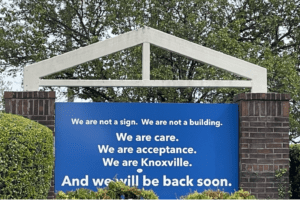Illinois professor discusses US colonialism, recent history
Associate professor Daniel Immerwahr discussed his newest book on the history the United States ignores. His lecture was a part of the Charles O. Jackson Memorial Lecture series.

Daniel Immerwahr, an associate professor at Northwestern University, delivered the UT history department’s first lecture of the semester on Sept. 3 in Strong Hall.
As part of the Charles O. Jackson Memorial Lecture series, Immerwahr’s lecture was titled the same as his latest book, “How to Hide an Empire: The Story of the Greater United States.”
The visiting professor discussed the history of colonialism in the United States and how U.S. territories are purposefully excluded from U.S. history.
Immerwahr used the Philippines during World War II as an example.
He explained that the Japanese invaded and occupied the Philippines, which was a territory of the U.S. at the time. While the U.S. fought the Japanese and reclaimed the territory, 1.1 million Filipinos died in the process.
Immerwahr explained how the death toll was the equivalent of two civil wars.
“That’s the bloodiest event that has ever happened on U.S. soil,” Immerwahr said, “and you don’t see it in U.S. history textbooks.”
“The reason you most likely don’t see it is that, although those books are telling you about U.S. history, they’re telling you about the history of the mainland,” Immerwahr said. “When we talk about U.S. history like that, [the invasion is] the kind of thing you miss.”
Immerwahr explained that the only time in U.S. history that does focus on the territories was the Spanish-American War in 1898. After the war, the U.S. claimed the Philippines, Guam and Puerto Rico.
“If there’s one moment in U.S. history that shows up in a textbook and actually does include the territories of the United States, it’s that one,” Immerwahr said.
“This was a big moment in U.S. history. This was a moment when it was quite clear that the dimensions of the country had changed,” Immerwahr said. “It was obvious that the United States was an empire.”
Shortly after claiming the territories from Spain, the U.S. claimed Hawaii and American Samoa.
Immerwahr then compared the empire of the U.S. to the British Empire.
He explained how the British celebrate Empire Day and has a colonial office building to better represent its territories. On the other hand, the U.S. has neither.
“The United States has a pretty significant empire with millions of people living in it, but we don’t really talk about it,” Immerwahr said.
“The United States distinguishes itself from other empires, yet [the U.S.] doesn’t seem proud about it or want to talk about it at all.”
Immerwahr spoke about how Americans throughout history have been conflicted over the country’s territories.
“Throughout U.S. history, there’s been this vagueness about what is really part of this country and what is not,” Immerwahr said.
He explained that even today people still focus solely on the mainland United States and overlook the territories.
Immerwahr’s book discusses what changes people see in U.S. history when these territories are considered.
In 2015, Immerwahr published another book titled, “Thinking Small: The United States and the Lure of Community Development.” His writing has been featured in The Washington Post, The Guardian and more.
Edited by Maddie Torres and Ainsley Kelso
Featured image courtesy of Northwestern University



